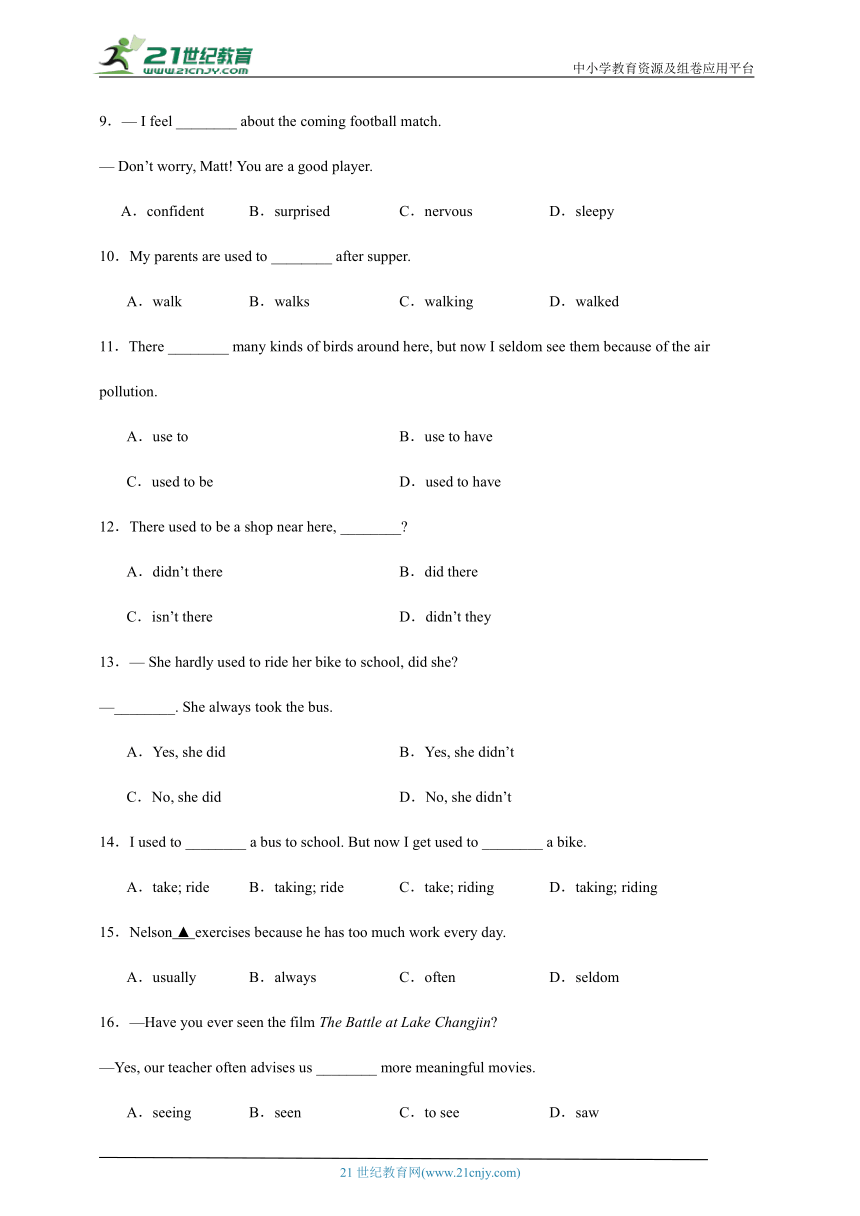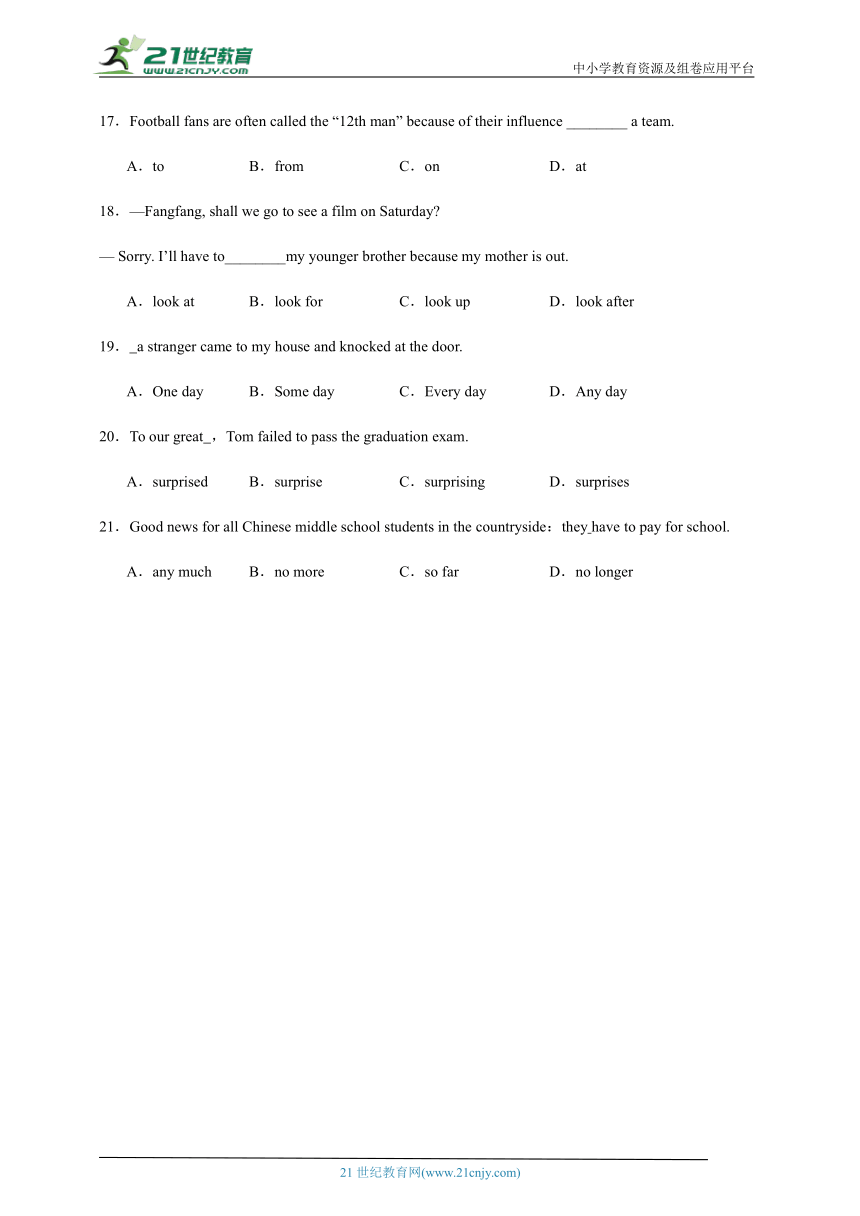Unit 4 I used to be afraid of the dark 易错易混知识点辨析 专项练 2024-2025学年上学期初中英语人教版九年级
文档属性
| 名称 | Unit 4 I used to be afraid of the dark 易错易混知识点辨析 专项练 2024-2025学年上学期初中英语人教版九年级 |

|
|
| 格式 | docx | ||
| 文件大小 | 45.5KB | ||
| 资源类型 | 试卷 | ||
| 版本资源 | 人教新目标(Go for it)版 | ||
| 科目 | 英语 | ||
| 更新时间 | 2024-11-11 15:42:28 | ||
图片预览



文档简介
中小学教育资源及组卷应用平台
Unit 4 I used to be afraid of the dark 易错易混知识点辨析 专项练 2024-2025学年上学期初中英语人教版九年级
1.As a result of my laziness, I failed ________ my work in time.
A.and finished B.to finish
C.and finishing D.to finishing
2.—Miss Wang, I’m sorry I’m late. I ______ to catch the early bus.
—It doesn’t matter. You’d better come to school earlier next time.
A.needed B.failed C.continued D.tried
3.The river in my village is clean now. However, it ________ polluted seriously.
A.is used to be B.was used to be
C.used to be D.was used to being
4.I _______ keep dogs for protection, but now I keep them as pets.
A.would rather B.had better C.used to D.have to
5.—________ you ________ to drink milk
—Yes, it’s good for health.
A.Did; use B.Did; used C.Were; use D.Were; used
6.He used to ________ books to relax himself, but now he has been used to ________ mountains.
A.read; climb B.reading; climb
C.read; climbing D.reading; climbing
7.When I was a kid, some of my pocket money ________ to buy stuffed toy animals.
A.uses B.is used C.used D.was used
8.What are you nervous _________ , Mary
A.in B.at C.on D.about
9.— I feel ________ about the coming football match.
— Don’t worry, Matt! You are a good player.
A.confident B.surprised C.nervous D.sleepy
10.My parents are used to ________ after supper.
A.walk B.walks C.walking D.walked
11.There ________ many kinds of birds around here, but now I seldom see them because of the air pollution.
A.use to B.use to have
C.used to be D.used to have
12.There used to be a shop near here, ________
A.didn’t there B.did there
C.isn’t there D.didn’t they
13.— She hardly used to ride her bike to school, did she
—________. She always took the bus.
A.Yes, she did B.Yes, she didn’t
C.No, she did D.No, she didn’t
14.I used to ________ a bus to school. But now I get used to ________ a bike.
A.take; ride B.taking; ride C.take; riding D.taking; riding
15.Nelson ▲ exercises because he has too much work every day.
A.usually B.always C.often D.seldom
16.—Have you ever seen the film The Battle at Lake Changjin
—Yes, our teacher often advises us ________ more meaningful movies.
A.seeing B.seen C.to see D.saw
17.Football fans are often called the “12th man” because of their influence ________ a team.
A.to B.from C.on D.at
18.—Fangfang, shall we go to see a film on Saturday
— Sorry. I’ll have to________my younger brother because my mother is out.
A.look at B.look for C.look up D.look after
19. a stranger came to my house and knocked at the door.
A.One day B.Some day C.Every day D.Any day
20.To our great ,Tom failed to pass the graduation exam.
A.surprised B.surprise C.surprising D.surprises
21.Good news for all Chinese middle school students in the countryside:they have to pay for school.
A.any much B.no more C.so far D.no longer
参考答案:
1.B
考查动词不定式。fail to do sth. “未能做(成)某事”,此处指的是由于懒惰,未能及时完成工作。故选B。
2.B
考查动词辨析。needed需要;failed失败,不够;continued继续;tried尝试。根据“I’m sorry I’m late.”可知,迟到了是因为没有赶上早班车。因此应用动词短语fail to do sth.表示“做某事失败”。故选B。
3.C
考查动词短语。be used to do sth.被用来做某事;used to do sth.表示过去常常做某事;be used to doing sth.表示习惯做某事。根据“However, it...polluted seriously.”可知,过去河水被严重污染,应用used to do sth.故选C。
4.C
考查短语辨析。would rather宁愿;had better最好;used to过去常常;have to不得不,必须。根据“but now I keep them as pets”可知,此处介绍过去的情况,used to do sth.“过去常常做某事”。故选C。
5.A
考查一般疑问句。根据“...you...to drink milk ”可知,过去常常喝牛奶符合语境,其一般疑问句结构为“Did sb use to do sth”。故选A。
6.C
考查非谓语动词。used to do sth.“过去常常做某事”,be used to doing sth.“习惯于做某事”, 7.D
考查时态和被动语态。uses使用,一般现在时;is used被使用,一般现在时的被动语态;used使用,一般过去时;was used被使用,一般过去时的被动语态。分析题干可知,主语“some of my pocket money”和动词“use”之间是被动关系,结合“When I was a kid”可知,应用一般过去时的被动语态。故选D。
8.D
考查介词辨析,in在……里;at在;on在……上;about关于,大约。固定搭配:be nervous about“对……紧张”,故选D。
9.C
考查形容词词义辨析。confident自信的;surprised惊讶的;nervous担忧的;sleepy困倦的。根据“Don’t worry, Matt!”可知,此处指感到担忧。故选C。
10.C
考查非谓语。be used to do sth被用来做某事;be used to doing sth习惯于做某事,结合语境,此处应用动名词形式,表示习惯于散步,故选C。
11.C
考查there be和used to do结构。根据“There…many kinds of birds around here, but now...”可知此处表示过去曾经有很多种鸟,用结构there used to be“过去曾经有”。故选C。
12.A
考查反义疑问句。反义疑问句遵循“前肯后否,前否后肯”的原则,并且疑问部分时态、人称要与前文保持一致。陈述部分是肯定句,则疑问部分用否定形式,本句中前文used to表示过去发生的动作,所以助动词用didn’t,后跟there,故选A。
13.D
考查反意疑问句。回答反意疑问句时,若事实是肯定的,用yes回答;若事实是否定的,用no来回答;根据“She always took the bus.”可知,她过去不是骑自行车上学,应用否定回答。故选D。
14.C
考查一般过去时态和动名词。根据“But now”可知,第一空指过去做的事情,第二空指现在的习惯。根据“used to do”过去常常做某事,可知第一空是take;第二空get used to doing“习惯于做某事”,所以是riding。故选C。
15.D
考查副词辨析。A. 通常;B. 一直;C. 经常;D. 很少,表否定。根据后述原因because he has too much work every day.可知尼尔森很少锻炼,故选D。
16.C
考查动词不定式。advise sb. to do sth.“建议某人做某事”,空处应是to see。故选C。
17.C
考查介词。to朝;from从……;on在……上;at在……点时;结合空格后的“a team”可知,此处是influence on“对……的影响”,是固定短语,后接影响的对象,故选C。
18.D
考查动词短语。look at看……;look for寻找;look up查询、抬头看;look after照看、照顾。根据题干中Sorry及because my mother is out可知,因为妈妈外出,我周六不得不在家“照看”弟弟,所以空处的短语应是“look after”,故选D。
19.A
A. One day过去或未来的一天;B. Some day原意“若干天”,引申义"来日"(将来的某一天),或"总有一天"。常用于将来时;C. Every day每天;D. Any day随便哪一天(不论怎样)。由句子a stranger came to my house and knocked at the door.可以知道,此句的时态为过去时,因此只有A符合语境。
20.B
great是形容词,后面只能跟名词,A/C都是形容词,排除;surprises是动词的三单形式,也不对。
21.D
A. any much什么都没有;B. no more不在;C. so far 到目前为止;D. no longer不在。no more一般置于行为动词后;no longer通常置于be或行为动词前;have to pay for是行为动词,因此用no longer而不用no more。
21世纪教育网 www.21cnjy.com 精品试卷·第 2 页 (共 2 页)
21世纪教育网(www.21cnjy.com)
Unit 4 I used to be afraid of the dark 易错易混知识点辨析 专项练 2024-2025学年上学期初中英语人教版九年级
1.As a result of my laziness, I failed ________ my work in time.
A.and finished B.to finish
C.and finishing D.to finishing
2.—Miss Wang, I’m sorry I’m late. I ______ to catch the early bus.
—It doesn’t matter. You’d better come to school earlier next time.
A.needed B.failed C.continued D.tried
3.The river in my village is clean now. However, it ________ polluted seriously.
A.is used to be B.was used to be
C.used to be D.was used to being
4.I _______ keep dogs for protection, but now I keep them as pets.
A.would rather B.had better C.used to D.have to
5.—________ you ________ to drink milk
—Yes, it’s good for health.
A.Did; use B.Did; used C.Were; use D.Were; used
6.He used to ________ books to relax himself, but now he has been used to ________ mountains.
A.read; climb B.reading; climb
C.read; climbing D.reading; climbing
7.When I was a kid, some of my pocket money ________ to buy stuffed toy animals.
A.uses B.is used C.used D.was used
8.What are you nervous _________ , Mary
A.in B.at C.on D.about
9.— I feel ________ about the coming football match.
— Don’t worry, Matt! You are a good player.
A.confident B.surprised C.nervous D.sleepy
10.My parents are used to ________ after supper.
A.walk B.walks C.walking D.walked
11.There ________ many kinds of birds around here, but now I seldom see them because of the air pollution.
A.use to B.use to have
C.used to be D.used to have
12.There used to be a shop near here, ________
A.didn’t there B.did there
C.isn’t there D.didn’t they
13.— She hardly used to ride her bike to school, did she
—________. She always took the bus.
A.Yes, she did B.Yes, she didn’t
C.No, she did D.No, she didn’t
14.I used to ________ a bus to school. But now I get used to ________ a bike.
A.take; ride B.taking; ride C.take; riding D.taking; riding
15.Nelson ▲ exercises because he has too much work every day.
A.usually B.always C.often D.seldom
16.—Have you ever seen the film The Battle at Lake Changjin
—Yes, our teacher often advises us ________ more meaningful movies.
A.seeing B.seen C.to see D.saw
17.Football fans are often called the “12th man” because of their influence ________ a team.
A.to B.from C.on D.at
18.—Fangfang, shall we go to see a film on Saturday
— Sorry. I’ll have to________my younger brother because my mother is out.
A.look at B.look for C.look up D.look after
19. a stranger came to my house and knocked at the door.
A.One day B.Some day C.Every day D.Any day
20.To our great ,Tom failed to pass the graduation exam.
A.surprised B.surprise C.surprising D.surprises
21.Good news for all Chinese middle school students in the countryside:they have to pay for school.
A.any much B.no more C.so far D.no longer
参考答案:
1.B
考查动词不定式。fail to do sth. “未能做(成)某事”,此处指的是由于懒惰,未能及时完成工作。故选B。
2.B
考查动词辨析。needed需要;failed失败,不够;continued继续;tried尝试。根据“I’m sorry I’m late.”可知,迟到了是因为没有赶上早班车。因此应用动词短语fail to do sth.表示“做某事失败”。故选B。
3.C
考查动词短语。be used to do sth.被用来做某事;used to do sth.表示过去常常做某事;be used to doing sth.表示习惯做某事。根据“However, it...polluted seriously.”可知,过去河水被严重污染,应用used to do sth.故选C。
4.C
考查短语辨析。would rather宁愿;had better最好;used to过去常常;have to不得不,必须。根据“but now I keep them as pets”可知,此处介绍过去的情况,used to do sth.“过去常常做某事”。故选C。
5.A
考查一般疑问句。根据“...you...to drink milk ”可知,过去常常喝牛奶符合语境,其一般疑问句结构为“Did sb use to do sth”。故选A。
6.C
考查非谓语动词。used to do sth.“过去常常做某事”,be used to doing sth.“习惯于做某事”, 7.D
考查时态和被动语态。uses使用,一般现在时;is used被使用,一般现在时的被动语态;used使用,一般过去时;was used被使用,一般过去时的被动语态。分析题干可知,主语“some of my pocket money”和动词“use”之间是被动关系,结合“When I was a kid”可知,应用一般过去时的被动语态。故选D。
8.D
考查介词辨析,in在……里;at在;on在……上;about关于,大约。固定搭配:be nervous about“对……紧张”,故选D。
9.C
考查形容词词义辨析。confident自信的;surprised惊讶的;nervous担忧的;sleepy困倦的。根据“Don’t worry, Matt!”可知,此处指感到担忧。故选C。
10.C
考查非谓语。be used to do sth被用来做某事;be used to doing sth习惯于做某事,结合语境,此处应用动名词形式,表示习惯于散步,故选C。
11.C
考查there be和used to do结构。根据“There…many kinds of birds around here, but now...”可知此处表示过去曾经有很多种鸟,用结构there used to be“过去曾经有”。故选C。
12.A
考查反义疑问句。反义疑问句遵循“前肯后否,前否后肯”的原则,并且疑问部分时态、人称要与前文保持一致。陈述部分是肯定句,则疑问部分用否定形式,本句中前文used to表示过去发生的动作,所以助动词用didn’t,后跟there,故选A。
13.D
考查反意疑问句。回答反意疑问句时,若事实是肯定的,用yes回答;若事实是否定的,用no来回答;根据“She always took the bus.”可知,她过去不是骑自行车上学,应用否定回答。故选D。
14.C
考查一般过去时态和动名词。根据“But now”可知,第一空指过去做的事情,第二空指现在的习惯。根据“used to do”过去常常做某事,可知第一空是take;第二空get used to doing“习惯于做某事”,所以是riding。故选C。
15.D
考查副词辨析。A. 通常;B. 一直;C. 经常;D. 很少,表否定。根据后述原因because he has too much work every day.可知尼尔森很少锻炼,故选D。
16.C
考查动词不定式。advise sb. to do sth.“建议某人做某事”,空处应是to see。故选C。
17.C
考查介词。to朝;from从……;on在……上;at在……点时;结合空格后的“a team”可知,此处是influence on“对……的影响”,是固定短语,后接影响的对象,故选C。
18.D
考查动词短语。look at看……;look for寻找;look up查询、抬头看;look after照看、照顾。根据题干中Sorry及because my mother is out可知,因为妈妈外出,我周六不得不在家“照看”弟弟,所以空处的短语应是“look after”,故选D。
19.A
A. One day过去或未来的一天;B. Some day原意“若干天”,引申义"来日"(将来的某一天),或"总有一天"。常用于将来时;C. Every day每天;D. Any day随便哪一天(不论怎样)。由句子a stranger came to my house and knocked at the door.可以知道,此句的时态为过去时,因此只有A符合语境。
20.B
great是形容词,后面只能跟名词,A/C都是形容词,排除;surprises是动词的三单形式,也不对。
21.D
A. any much什么都没有;B. no more不在;C. so far 到目前为止;D. no longer不在。no more一般置于行为动词后;no longer通常置于be或行为动词前;have to pay for是行为动词,因此用no longer而不用no more。
21世纪教育网 www.21cnjy.com 精品试卷·第 2 页 (共 2 页)
21世纪教育网(www.21cnjy.com)
同课章节目录
- Unit 1 How can we become good learners.
- Section A
- Section B
- Unit 2 I think that mooncakes are delicious!
- Section A
- Section B
- Unit 3 Could you please tell me where the restroom
- Section A
- Section B
- Unit 4 I used to be afraid of the dark.
- Section A
- Section B
- Unit 5 What are the shirts made of?
- Section A
- Section B
- Review of Units 1-5
- Unit 6 When was it invented?
- Section A
- Section B
- Unit 7 Teenagers should be allowed to choose their
- Section A
- Section B
- Unit 8 It must belong to Carla.
- Section A
- Section B
- Unit 9 I like music that I can dance to.
- Section A
- Section B
- Unit 10 You're supposed to shake hands.
- Section A
- Section B
- Review of Units 6-10
- Unit 11 Sad movies make me cry.
- Section A
- Section B
- Unit 12 Life is full of the unexpected
- Section A
- Section B
- Unit 13 We're trying to save the earth!
- Section A
- Section B
- Unit 14 I remember meeting all of you in Grade 7.
- Section A
- Section B
- Review of Units 11-14
